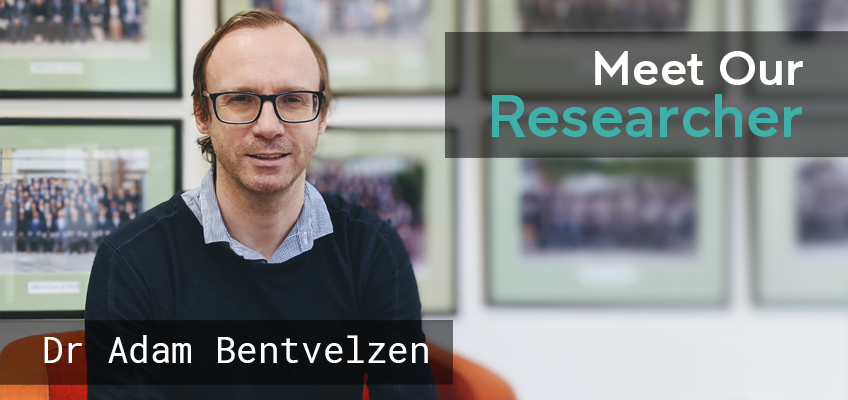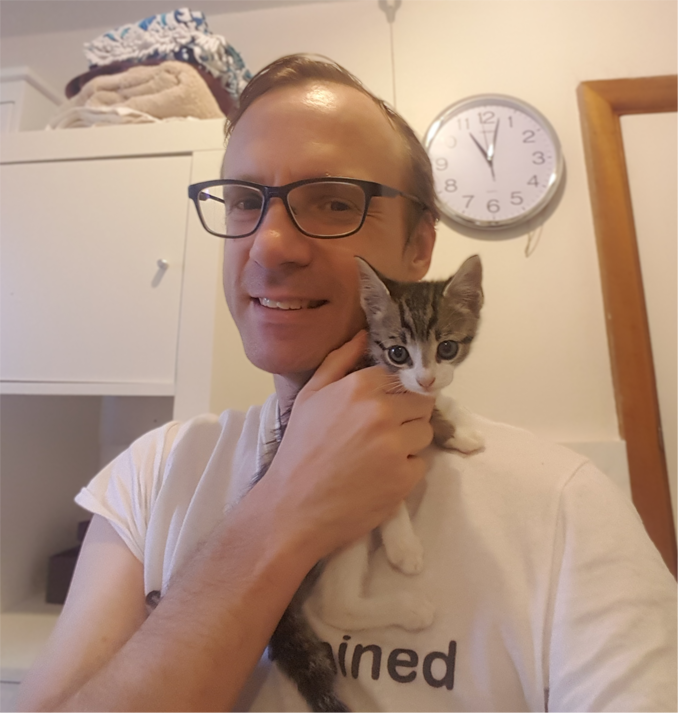19 Jun 2020

The context of healthcare has certainly shifted in light of the COVID-19 pandemic and there is now a huge demand for flexibility when it comes to accessing practitioners and treatment. Dr Adam Bentvelzen is pioneering the way for alternative avenues of accessibility to healthcare services, particularly phone-based cognitive screening. He has been investigating this as a means of assessing patients with possible dementia who are geographically isolated or physically limited. This method has been successfully implemented for over ten years with participants in CHeBA’s Sydney Memory and Ageing Study.
How did you get into researching the ageing brain?
My first encounter with hands-on research was during my Honours project while completing a Bachelor of Psychology at the University of Sydney. It involved researching audio-visual perceptual interactions with some extraordinary high-tech gadgetry - which I greatly enjoyed - but wished to pursue something more grounded in the clinical sphere. Alongside University I was employed by a small company that used an ‘integrative neuroscience’ approach; basically meaning it was combining electrophysiological, genetic, and neuropsychological methods for diagnostic and pharmaceutical applications. Over these years, I was also involved in much volunteer work including providing respite for persons with severe brain injuries and telephone counselling for Lifeline. Following University I took a couple of years off to try some different things including Research Assistant work on the psychological response to pain and investigating the effects of innovative approaches to medical education; all still at the University of Sydney. The culmination of these experiences made me realise that my core interest was the clinical side of neuropsychology. As such, I returned to study a combined PhD/Master degree in Clinical Neuropsychology at Macquarie University. From this postgraduate clinical and research experience I felt that research into the ageing brain was a perfect fit for my aptitudes and interests and here I am today!
Did you experience a ‘defining moment’ which led you to this field?
I think it was a combination of moments that led me to this field, but probably what is most memorable is the enjoyment I gleaned from working with people severely disabled as a result of brain injury. The obvious and critical importance of this work for the individual as well as the families involved was certainly impactful. My fascination with how the brain worked was another factor in leading me to this field. This interest was fostered by third-year neuropsychology and neuroscience subjects at the University of Sydney, including those taught by Dr Diana Caine and Dr Karen Croot. Incidentally, Karen now happens to be on the CHeBA team with the CogScan project. The blend of these experiences inspired me to pursue this field and focus on older persons.
Do you have any personal interests or activities which are protective behaviours against cognitive decline?

Before we were practicing social distancing, I would cycle approximately 35 kms each week, and during COVID-19 I have instead adopted taking long walks. To keep myself challenged I always try to do a couple of projects at the same time and regularly read the latest articles on brain and ageing-related research, as well as fiction. While our new baby was up during the night I managed to read three novels from The Stormlight Archive by Brandon Sanderson. I am currently reading ‘Ten Thousand Doors of January’; a perfect escapist book for these current times. I am mostly vegetarian and try to eat minimal meat and I also enjoy cooking, which is mostly vegetarian with the occasional fish dish. Not sure if this counts as complex mental activity but before our baby came along, I had taken an interest in ‘escape rooms’ with my wife and friends which was a very fun challenge!
What are you currently researching?
I am currently focused on telephone interviewing with the Sydney Memory and Ageing Study, to try and help increase access to people who are either in remote circumstances or who are not sufficiently mobile or well enough to take themselves to a hospital for a comprehensive clinical assessment. We want to increase the validation and accuracy of these phone-based measures in an Australian population. For instance, GPs could use the phone as part of their follow-ups if the patient preferred this method and expand their practice to less mobile and more remote patients.
Why is your research important?
We need alternate ways to see patients who are limited by their geography, physical and mental status, whether that is a long face to face assessment with video or via phone. This lack of accessibility to services is a huge burden for these people and addressing this will improve equity and reduce their costs. Equally important is ensuring we, as researchers, increase our flexibility to reach and address these demographics.
In recent times, the demand for phone-based assessment tools has clearly increased, evidenced by the number of emails and calls from doctors, psychologists and clinical researchers asking for our papers and cut-off scores. We really hope, especially in these times, to be able to help reach people that we cannot necessarily see face to face. This will have great relevance even after COVID-19.
What do you love about working for CHeBA?
As a Research Assistant working directly with participants in our Memory and Ageing Study is, at all times, a real honour and privilege. They are just amazing people; firstly for sticking with the study for such an extended period of time as it has been over 12 years in duration, and secondly for their willingness to assist us in our research as they enter the later stages of their lives; regardless of their health. Personally, I have been here for more than three years and watching participants change and decline is truly heartbreaking. To be afforded some insight into their lives is an honour and a privilege. Our study participants have so much positivity and hope. I recall one participant saying: “I have had a good life and anything else is a bonus” which was very touching.
Overall, working with these older Australians has been overwhelmingly positive and frankly, at times, I have been really amazed by what people can still do, what their attitude to life is like and their ongoing capacity for socialisation and work.
CHeBA is an amazing team to work with. We conduct quality research and are world renowned. We have so many great postdocs and neuropsychologists in the team and the Centre’s Co-Directors Henry and Perminder are of course legendary. The Memory and Ageing Study team itself has been fantastic and at the moment, our output is better than ever. Feeling like you are on the forefront of valuable research outcomes has been a privilege and I feel very special to continue to be involved.
What is the ultimate hope you have for your research?
I hope that telephone cognitive assessments become more common practice. People should at least try this, as although we may not be able to stop dementia yet, we need to be able to assess these people and reach them as soon as possible to identify whether something is wrong. Only then can we potentially intervene to help them. I genuinely hope this takes off. Our study participants are highly adaptable, open to change, curious and young at heart. Ultimately, I hope that we can use all the tools at our disposal to the best of our ability as researchers and clinicians to defeat dementia.
This interview was undertaken during the COVID-19 self-isolation period. Dr Adam Bentvelzen found that having video calls over dinner with his family and friends supported his mental resilience and kept him feeling socially connected while physically isolated. He has also regularly reminded himself of previous challenging times that required resilience to get through, such as the final few months of finishing a PhD, and months caring for a loved one when they were recovering from a serious operation.
Donations are fundamental for critical research to continue following COVID-19.
If you would like to discuss supporting Dr Bentvelzen’s work specifically, or would like information
on leaving a legacy via a Gift in your Will, please contact h.douglass@unsw.edu.au.

Dr Adam Bentvelzen is a Research Assistant at CHeBA within the Sydney Memory and Ageing Study. Simultaneously, he is a Clinical Neuropsychology Registrar; having completed his PhD and Master of Clinical Neuropsychology at Macquarie University. His broader research interests revolve around clinical application to assist neuropsychologists detect memory disorders early and accurately. Dr Bentvelzen keeps mentally active through reading, exercise and navigating the challenge of work-life balance with a newborn.
